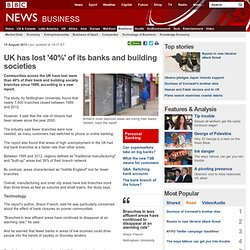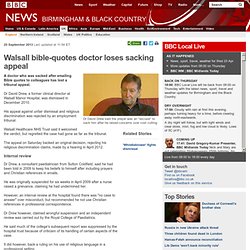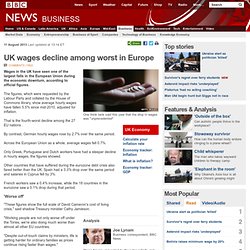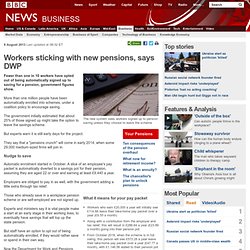

UK has lost '40%' of its banks and building societies. 19 August 2013Last updated at 19:17 ET Britain's most deprived areas are losing their banks fastest, says the report Communities across the UK have lost more than 40% of their bank and building society branches since 1989, according to a new report.

The study, by Nottingham University, found that nearly 7,500 branches closed between 1989 and 2012. However, it said that the rate of closure had been slower since the year 2000. The industry said fewer branches were now needed, as many customers had switched to phone or online banking. The report also found that areas of high unemployment in the UK had lost bank branches at a faster rate than other areas. Between 1995 and 2012, regions defined as "traditional manufacturing" and "built-up" areas lost 39% of their branch network. By contrast, areas characterised as "middle England" lost far fewer branches. Overall, manufacturing and inner city areas have lost branches more than three times as fast as suburbs and small towns, the study says. Technology. Walsall bible-quotes doctor loses sacking appeal. 25 September 2013Last updated at 11:54 ET Dr David Drew said the prayer was an "excuse" to sack him after he raised concerns over cost cutting A doctor who was sacked after emailing Bible quotes to colleagues has lost a tribunal appeal.

Dr David Drew, a former clinical director at Walsall Manor Hospital, was dismissed in December 2010. His appeal against unfair dismissal and religious discrimination was rejected by an employment tribunal. Walsall Healthcare NHS Trust said it welcomed the verdict, but regretted the case had gone as far as the tribunal. The appeal on Saturday backed an original decision, rejecting his religious discrimination claims, made by a hearing in April 2012.
Internal review Dr Drew, a consultant paediatrician from Sutton Coldfield, said he had been told in 2009 to keep his beliefs to himself after including prayers and Christian references in emails. He was originally suspended for six weeks in April 2009 after a nurse raised a grievance, claiming he had undermined her. UK is Europe's 'addictions capital', says think tank. 1 September 2013Last updated at 05:39 ET One in 12 young people in the UK said they had taken legal highs, according to the think tank The UK has become the drug and alcohol "addictions capital of Europe", a think tank has warned.

The Centre for Social Justice - set up by Work and Pensions Secretary Iain Duncan Smith - said drink and drug abuse cost the UK £36bn a year. Its report warned that the UK has become a hub for websites peddling potentially dangerous "legal highs". The CSJ also criticised the government for failing to tackle heroin addiction and cheaply available alcohol. The report, No Quick Fix, found that last year 52 people in England and Wales died after taking legal highs, up from 28 the previous year. The substances, sometimes referred to as club drugs and including Salvia and Green Rolex, are often marketed as bath salts or research chemicals. 'Faster bans needed' Continue reading the main story “Start Quote End QuoteNoreen OliverChairwoman, CSJ review North/South divide.
UK wages decline among worst in Europe. 11 August 2013Last updated at 13:14 ET One think tank said this year that the drop in wages was "unprecedented" Wages in the UK have seen one of the largest falls in the European Union during the economic downturn, according to official figures.

The figures, which were requested by the Labour Party and collated by the House of Commons library, show average hourly wages have fallen 5.5% since mid-2010, adjusted for inflation. That is the fourth-worst decline among the 27 EU nations . By contrast, German hourly wages rose by 2.7% over the same period. Across the European Union as a whole, average wages fell 0.7%. Only Greek, Portuguese and Dutch workers have had a steeper decline in hourly wages, the figures showed. Other countries that have suffered during the eurozone debt crisis also fared better than the UK. French workers saw a 0.4% increase, while the 18 countries in the eurozone saw a 0.1% drop during that period. 'Worse off' Workers sticking with new pensions, says DWP. 8 August 2013Last updated at 08:32 ET The new system sees workers signed up to pension saving unless they choose to leave the scheme Fewer than one in 10 workers have opted out of being automatically signed up to saving for a pension, government figures show.

More than one million people have been automatically enrolled into schemes, under a coalition policy to encourage saving. The government initially estimated that about 25% of those signed up might take the option to leave the savings scheme. But experts warn it is still early days for the project. They say that a "pensions crunch" will come in early 2014, when some 29,000 medium-sized firms will join in. Nudge to save Automatic enrolment started in October. Employers are obliged to pay in as well, with the government adding a little extra through tax relief. News Republic. David Cameron visiting the A&E department in Salford royal hospital on Thursday.

Show captions Showing image 1 of 1.
Crime. Economics. Transport. Business. Property. Government. Nhs. Law. Politics. Conservatives. Labour.